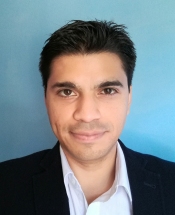1. Why has the Development Studies Group been formed?

The Development Studies Group (DSG) emerges from the realisation that many researchers at the University of Portsmouth were doing incredible research projects in the field of development studies, but were scattered across different disciplines and faculties and often not knowing about each other’s work. We needed a cross-faculty/cross-disciplinary initiative to weave together these researchers and showcase how this rich community of academics are working in development-related issues for poor and vulnerable communities in the developing world. Our research hotspots include regions in Africa, Asia, the Middle East, Latin America and beyond.
2. As leader of the group, how do you see it working?
Our group works as a participatory network run for and by researchers. The network springs into life inspired by our researchers’ ethos concerned with finding ways to improve the lives of poor and vulnerable people in the developing world. Our researchers stem from a variety of disciplines which include, but are not limited to: Anthropology, Computing, Economics, Engineering, Environmental Research, Geography, Marketing, Medicine, Operations Research, Political Science and Sociology. The DSG is like a live jigsaw puzzle of researchers who connect together conscious that only in concert can we generate better ideas, knowledge and skills capable of lifting people out of the depths of poverty and social exclusion and/or helping them face threats to their security, to their sustainable livelihoods and their environment.
3. What are the benefits of cross-study working?
Blending together our different forms of knowledge at the Development Studies Group improves the overall effectiveness and impact of our research. Burning issues like poverty, social exclusion, social insecurity or climate change cry out loud for more multidimensional, systemic and sustainable solutions. The only way to do this is by breaking the traditional disciplinary silos in which universities have usually worked and go beyond them. Part of the DSG’s agenda is reaching out to non-academic communities, policy-makers and organisations to increase the real impact of our research into practice.
4. How does the group link in with the research themes?
Our DSG researchers produce knowledge tightly linked to our University’s four cross-disciplinary research themes: democratic citizenship, future and emerging technologies, health and wellbeing, security and risk and sustainability and the environment. This is due to the very nature of the DSG: it is oriented towards exploring burning issues that affect developing countries. Our research pillars include: Just Society, Health and Wellbeing, Water and Aquatic Resources, and Infrastructure and Technology. As a whole, these research pillars add value, flex and extend our research muscle on a global scale, making the University of Portsmouth stand out as a unique player in development issues.
5. What has been achieved so far?
The Development Studies Group has developed into a dynamic and recognisable network of more than eighty researchers at the University of Portsmouth. We have expanded our web of academics with like-minded academics, organisations and people from developing countries and have begun to also link researchers to development practitioners. This way we aim to foster more multidisciplinary collaborative projects with real impacts in the developing world connecting researchers to opportunities that would have been impossible to apply as individual academics. Furthermore, we are also pleased to have helped organised development studies events, workshops and seminars at our university which have sparked growing interest in development themes. Thanks to the DSG’s efforts, we are bridging the communication gap that isolated many of our researchers and anchored their ideas in restrictive disciplinary silos. The evolving DSG website, blog, newsletters and lively events illustrate some of our efforts in this area.
6. What do you perceive as the biggest challenge going forward?
I think the biggest challenge for our Development Studies Group in the present context is facing as a community of researchers the changing landscape of research funding, especially in a post-Brexit world. We need to empower our academic teams to become more effective and resilient collaborative leaders to adapt to increasing competition in a brave new world of diminishing sources of funding.
7. How can people get in touch with you?
We invite all our academic community working or interested in research related to development issues to join us. So please contact me by e-mail: carlos.zepeda@port.ac.uk or at my office +44 (0) 239 284 4158. I am always happy to meet up face-to-face and exchange ideas and suggestions with our researchers.

